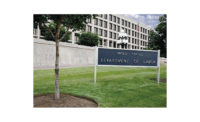A federal judge has issued a preliminary injunction temporarily halting an Obama administration rule that would require federal contractors and subcontractors to disclose past labor-law violations.
Judge Marcia Crone, of the U.S. District Court for the Eastern District of Texas, ruled on Oct. 24 that the Fair Pay and Safe Workplaces regulation, would cause “irreparable harm” to contractors and subcontractors if it were to take effect. The rule, which contractors have dubbed the "blacklisting" regulation, had an effective date of Oct. 25.
The Associated Builders and Contractors, along with its Southeast Texas Chapter and the National Association of Security Companies, filed a legal challenge to the rule on Oct. 7, and motions for a temporary restraining order and a preliminary injunction on Oct. 13.
The district court’s ruling puts the regulation on hold runtil the court issues a decision on the underlying lawsuit.
The final rule, issued by the Federal Acquisition Regulation (FAR) Council on Aug. 25, along with a Dept. of Labor guidance document, would require contractors and subs to disclose violations of 14 federal labor, safety and health, and employment laws, as well as related state laws, before they could win a federal contract valued at more than $500,000.
The FAR Council's rule and Labor Dept. guidance aim to implement a July 2014 presidential executive order calling for the new disclosure requirements for contractors and subcontractors.
Construction industry organizations and other business groups contend that the regulation would give federal contracting officials broad discretion to discriminate against contractors that have alleged violations. The industry groups say that many of those allegations, if reviewed by courts, would likely be dismissed.
On the other hand, labor unions, and the Labor Dept. say that the rule is necessary to ensure that contractors that have a pattern of breaking labor and employment laws do not win federal contracts.
The regulation would be phased in. It initially would only requiring contractors bidding on projects worth $50 million or more to disclose violations. But on April 25, 2017, the contract threshold would fall to $500,000—thus applying to many more contracts. Then, starting on Oct. 25, 2017, the $500,000 threshold would be extended to cover subcontractors.
In her 32-page opinion, Judge Crone said that the industry groups’ motion met all the requirements to trigger an injunction, which included showing that they would experience “irreparable harm” in the absence of immediate relief. She also said that the organizations would probably prevail in their lawsuit lagainst the administration. “The public disclosure and disqualification requirements being imposed on federal contractors and subcontractors are nowhere found in or authorized by the statute on which [the rule and the guidance] relies,” known as the Procurement Act.
Ben Brubeck, ABC vice president of regulatory, labor and state affairs, says his group was pleased that the court ruled that “the Obama administration cannot order private businesses to publicly disclose mere accusations of labor law violations that have not been fully adjudicated.” He adds that though contractors that knowingly violate the law should “be held accountable,” the rule and guidance are “poorly crafted.”
The Labor Dept. did not respond to ENR's request for a comment. Terry O'Sullivan, general president of the Laborers International Union of North America, which supports the rule, said in an emailed statement, "We hope the preliminary injunction is lifted quickly so that the Fair Pay and Safe Workplaces rule is implemented and contractors who put the well-being of workers at-risk aren’t able to take advantage of federal contracts."
OSHA Injury and Illness Recordkeeping Rule
In related news, the Labor Dept. issued new guidance on Oct. 19 that clarifies its position on post-incident drug testing when an injury or accident occurs on a jobsite. In a final injury and illness record-keeping rule, released on May 12, the Labor Dept.'s Occupational Safety and Health Administration (OSHA) said that drug testing after a workplace injury or accident would unfairly retaliate against employees.
Representatives of the Associated General Contractors of America met with OSHA officials on Aug. 30 to discuss how, in their view, the rule could have the unintended consequence of hurting, rather than helping improve, workplace safety by preventing employers from accurately identifying the cause of some accidents.
In its new guidance document to regional administrators, DOL Deputy Administator Dorothy Dougherty said that it the agency will not issue citations for post-incident drug testing that complies with state workers’ compensation laws—whether such testing under those statutes law is mandatory or voluntary.
Dougherty also said, however, that drug testing for injuries that could not have been caused by drug use—such as a repetitive strain injury—would likely violate the record-keeping rule.
“Generally speaking, the new guidance is more likely than [OSHA's] previous position to allow for—and not overly restrict—many construction companies’ existing policies regarding employee post-incident drug testing,” Brian Turmail, AGC’s senior executive director of public affairs, noted in a statement.


